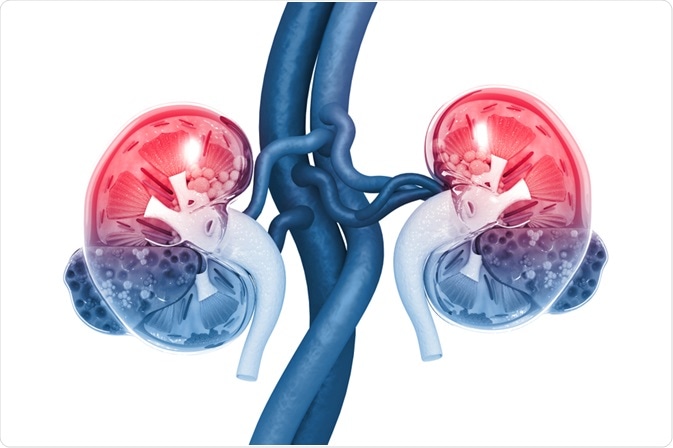Also known as acute renal failure, acute kidney injury (AKI) refers to the sudden loss of excretory kidney function. AKI can be identified by the accumulation of toxic metabolic products like urea and creatinine in the body, a reduction in the volume of urine. or both.

Image Credit: crystal light / Shutterstock.com
Incidence
AKI occurs in several ways. Based on the various types, the incidence is as follows:
- Prerenal causes – 25-60%
- Renal causes – 35-70%
- Post-renal causes – 5-20%
Among these causes, ischemic or nephrotoxic insults are responsible for 80-90% of renal causes of AKI.
Signs and symptoms
Since AKI arises due to a failure in the kidney's ability to excrete substances, it is signaled by:
- Increased levels of nitrogen metabolites in the blood
- Oliguria (production of an abnormally small volume of urine) produced by a rapid fall in the glomerular filtration rate due to reduced renal blood flow.
These signs and symptoms are not exclusive to intrinsic renal pathology, but may also be caused by prerenal conditions such as acute hemorrhage, dehydration, or post-renal causes such as acute urinary tract obstruction.
Types of AKI
AKI may occur because of damage to any part of the kidney. With reference to the site of the injury, AKI may be classified as:
- Tubular (acute tubular necrosis)
- Glomerular (acute glomerulonephritis)
- Interstitial (acute interstitial nephritis)
- Vascular (caused by malignant hypertension)
Pathophysiology
AKI is the manifestation of a variety of clinical conditions, each of which acts through the same pathophysiologic mechanisms. These clinical conditions include hypoxia, ischemia, and nephrotoxicity.
Risk factors
Some of the different risk factors that are associated with AKI include:
- Hypovolemia
- Sepsis
- A pre-existing disease of the heart, kidney, or liver
- Hypotension
- Diabetes
- Age
- Exposure to nephrotoxic drugs or agents, such as contrast
- Critical illnesses, in which renal injury is due to sepsis-related changes
AKI occurs in 3-5% of hospitalized patients. In fact, an incidence of almost 70% has been reported in ICU patients, with about 4-5% of these patients requiring renal replacement therapy.
Notably, hospitalized patients with AKI have a mortality rate that is between 5.5 and 6.5 times higher than in similarly ill patients with normal kidney function. This incidence rate remains true despite the widespread use of dialysis.
Diagnosis and treatment
Diagnosis of AKI begins with finding the possible cause of the condition, such as drugs or diseases. A physical evaluation, followed by tests of kidney function and the identification of any abnormalities in the urine is mandatory. Additionally, imaging tests are also useful during the diagnosis process.
Treatment of akI involves finding the cause of the injury, identifying other medical conditions that coexist with the kidney injury, assessing the volume status and correcting it as early as possible with fluids and vasopressors, as well as using the right measures to correct or arrest renal abnormalities. Careful monitoring of the condition is therefore essential.
Treatment of AKI is supportive rather than curative. The kidney function slowly improves as the underlying clinical condition is treated and the toxic products are removed. Nutritional status needs to be monitored and carefully maintained, as a normal glycemic level is critical. Electrolytes and the acid-base levels must also be kept within normal limits.
Renal replacement therapy
Renal replacement therapy, which is more commonly referred to as dialysis, involves the use of cellulose or synthetic membranes. Typically, dialysis is indicated when the volume overload is significant, biochemical parameters are critically altered, and/or there is a dangerous buildup of metabolites like urea and creatinine.
Prognosis
Even mild AKI increases the risk of death. More than half of AKI patients die, despite renal replacement therapy.
If there is no comorbidity and the kidneys were previously normal, the patient is likely to recover to a point where dialysis is no longer required. However, between 5 and 50% of patients will need dialysis after being discharged from the hospital. Patients who are on dialysis are at higher risk of chronic kidney disease and, eventually, end-stage renal disease.
References
Further Reading
Last Updated: May 20, 2021